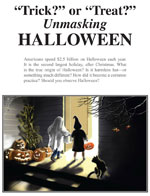You have probably met and known many different people in your life. Most of them may simply be acquaintances, while others you might consider friends. Of these, there may be only a few that you would consider close friends.
Most likely, there is one person who is as close to you as a brother or sister. He or she could be, as the Bible says, “a friend that sticks closer than a brother” (Prov. 18:24), someone in whom you can confide and trust, and with whom you can share your hopes and dreams. A friend who is there not only through the good times, but also the bad—through thick and thin—someone who will not desert you when the going gets tough.
A true friendship that stands the test of trials and time is rare. Friends may come and go, but to have a lifelong, close, personal friendship is truly a great blessing.
The story of Jonathan and David is the story of one such friendship. As you read about it, you will find that they shared much in common. There were also things that could have easily destroyed their bond, but instead, they made it stronger.
Jonathan—a Prince of Israel
Jonathan, prince and son of Saul, was the heir apparent to the throne of Israel. He was destined to rule after the death of his father. Jonathan was well aware of this and the promises God would have made to Saul had he been faithful (I Sam. 13:13).
Jonathan was a young man of courage, strength and determination who looked to and relied on God. He was a mighty soldier in his own right—highly respected and trusted by the men he led. These character traits were clearly evidenced when Jonathan fought against a garrison of Philistine soldiers with only his armor bearer by his side. Trusting in God, he slew 20 Philistines in a half-acre area of land.
This single act of bravery led to other events that encouraged his father and the 600 men with Saul to join in battle as well, leading to a great victory for Israel (I Sam. 14:1-23). It, along with other instances, caused him to grow in stature and respect among the army of Israel. So much so that these very men protected and rescued Jonathan, who had innocently violated a rash oath from his father the king that would have resulted in his death (14:24-46)!
David—a Keeper of Sheep
On the other hand, David, the youngest son of Jesse, was a ruddy, bright-eyed shepherd boy. On two occasions, he rescued his father’s sheep from a predator—a lion and a bear—grabbing hold of them and slaying them (I Sam. 17:34-36).
These feats and others caused him to be known as “cunning in playing [the harp], and a mighty valiant man, and a man of war, and prudent in matters, and a comely [handsome] person…” (I Sam. 16:18). In fact, it was David’s ability to play the harp that first gave him favor with Saul. The soothing music that David skillfully played refreshed and calmed Saul’s troubled spirit. This moved the king to bestow upon him the great honor of being his armor bearer.
Eventually, through marriage to the king’s daughter Michal, David even became a prince in Israel and brother-in-law to Jonathan.
Yet this favor and honor in Saul’s sight was not destined to last. As David also grew in stature and respect among the army and the people of Israel, Saul’s love and favor turned into bitterness, resentment and hate. Saul became determined to murder David, since he knew that he would replace him on the throne. This also meant that Jonathan would never be king.
Lasting Friendship Established
A single great event signaled both the beginning of Jonathan and David’s friendship and their falling from favor in Saul’s eyes—David’s defeat of the giant Goliath.
Goliath had been mocking and challenging the army of Israel for 40 days. To all who saw him, he seemed invincible—their worst nightmare! He stood well over nine feet tall and wore chest armor weighing about 125 pounds! His armor bearer could barely even carry his shield.
“A true friendship that stands the test of trials and time is rare. Friends may come and go, but to have a lifelong, close, personal friendship is truly a great blessing.”
Yet this did not frighten or deter David. He willingly challenged this champion of the Philistines, knowing that God would deliver him just as He had done from the bear and the lion. God was truly with David, and David knew that the Eternal would grant him victory over the man who defied the army of the living God.
Running straight toward him, David killed this mighty giant with nothing but a sling and a small stone. He then stood over Goliath, cut off his head, and brought it before Saul, speaking to him in the presence of Jonathan. When the Philistines saw that their champion was dead, they fled before the army of Israel, who chased after them in victory.
David’s courage and bravery that day affected Jonathan deeply; he was moved to love him as much as his own life. He realized that they shared much in common in the areas of courage, bravery, strength, loyalty, trust and faith in God. From that day forward, they were best friends. Jonathan was moved to the point of giving David some of his treasured items: his robe, sword, bow and belt, and even his armor.
Jonathan and David’s bond was so strong that they promised to never let anything come between them. Yet Saul, upon hearing the people praise David in singing, “Saul has slain his thousands and David his ten thousands,” sought to kill David from that day forward.
But Jonathan’s love for his friend only grew. Many times he interceded for David, warning him that his father was seeking to take his life. Jonathan urged his father not to do this, saying in I Samuel 19:4-5, “Let not the king sin against his servant, against David; because he has not sinned against you, and because his works have been towards you very good: for he did put his life in his hand, and slew the Philistine, and the Lord wrought a great salvation for all Israel: you saw it, and did rejoice: wherefore then will you sin against innocent blood, to slay David without a cause?”
Jonathan warned David and intervened on his behalf so often that he put his own life in danger, one time narrowly escaping death at the hand of his father. He even risked his life by traveling a great distance to see David in hiding, knowing that his father surely had spies watching every move. And he did this even though he was aware that David would ascend to the throne in his place. Understanding that he must decrease while David increased, he pledged to stand loyally beside him.
Think how easy it would have been for Jonathan to go along with his father’s plotting, giving in to carnal nature and lust for power. It would have been easy for him to fall into the same attitudes as Saul, to have a bitter state of mind, saying, “It is not fair, God! Why should I be punished just because my father messed up?” Instead, he not only accepted God’s decision, he became best friends with the man whom his own human nature would have considered his rival! In all of this, he showed great loyalty not only to David but also to God and His will. In a way, Jonathan showed allegiance to his father as well, preventing him from committing a terrible murder.
“Many times Jonathan interceded for David, warning him that his father was seeking to take his life.”
Likewise, David was loyal to Saul and Jonathan. During the many times that Jonathan and David were alone, it would have been very easy for David to give in to his human nature and kill a potential rival. Even when presented with the opportunity to sneak up on Saul (the very one trying to murder him) and kill him, David restrained himself. David well remembered the covenant made with his best friend, recalling the words Jonathan spoke: “And you shall not only while yet I live show me the kindness of the Lord, that I die not: but also you shall not cut off your kindness from my house forever: no, not when the Lord has cut off the enemies of David every one from the face of the earth” (I Sam. 20:14-15).
Even though David had been anointed king, he still showed high respect for Jonathan—even to the point of bowing before him three times. So great was his love that, upon the news of the deaths of Saul and Jonathan, he composed a lamentation called the “Song of the Bow” and instructed that it be taught to the children of Judah. What a wonderful display of true friendship, when so many would have rejoiced at the death of rivals.
Even after Jonathan died, David kept his promise to show kindness to his friend. He searched out Jonathan’s son Mephibosheth and provided for him the rest of his life.
You Can Have This Kind of Friendship!
Much can be learned from the friendship of Jonathan and David. They were both princes of Israel, one by birth, the other by marriage. They were both in line to assume the throne of Israel. Both were mighty men of valor and were respected and trusted by the men they led in battle. Each had accomplished great feats, relying on God for victory. They were zealous, driven, resourceful, courageous, bold, meek, humble and so much more. They knew and respected government, wielded authority, and served those under and over them. They were loyal to one another and to their king.
They could have been enemies and rivals, yet they set aside jealousy, resentment, bitterness, competition and lust for power, choosing instead to become the closest of friends. They knew how and when to laugh, cry, show their emotions, share hopes and dreams together, thereby cementing their friendship forever. They were real men, who understood what it meant to lay down their lives for one another. So great was their friendship that at one of their partings, “they wept together, but David more so” (I Sam. 20:41, New King James Version).
How rare this kind of friendship is in the world today!
Yet you can have this kind of friendship with God and Christ. Recall Christ’s words to His disciples: “Greater love has no man than this, that a man lay down his life for his friends. You are My friends, if you do whatsoever I command you. Henceforth I call you not servants; for the servant knows not what his lord does: but I have called you friends; for all things that I have heard of My Father I have made known unto you” (John 15:13-15).
The record of David and Jonathan’s friendship has been preserved in the Bible for our benefit. It pictures the close relationship between God the Father and Jesus Christ. They desire that same close, personal relationship with every human being. Jonathan and David’s friendship is a lasting legacy.
When David sees Jonathan come up in the resurrection, it will be just like the last day they saw each other, and they will continue to enjoy a friendship that will last for eternity.
You can develop that kind of friendship with God and Christ, and with all others of like mind, who share the same goals, hopes and dreams.
















